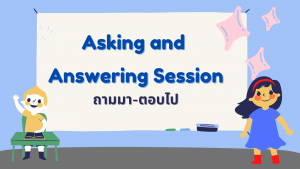การ ใช้ i you we they he she it: คุณกำลังดูกระทู้
PRONOUN คือ อะไร?
หลายคนตอบได้ว่า “คำสรรพนาม” ไง ง่ายๆ ไม่เห็นต้องถาม แต่! ที่ต้องถามเพราะคนส่วนใหญ่เวลาเจอข้อสอบ คำถามที่วัดเรื่องนี้ ยังจะมีความงงๆ ว่าควรใช้ Pronoun แบบไหน? คำนี้ กับคำนี้เหมือนกันมั้ยนะ? แม้คำถามจะง่ายแค่ไหน แต่ถ้าไม่แม่นซักที ก็เสียคะแนนเอาได้ง่ายๆ เลยนะ
ข้อสอบ TOEIC วัด Pronoun ยังไง?
ก่อนไปรู้จักกับ Pronoun ทั้ง 5 ลองทำโจทย์ข้อนี้ดูก่อน ถ้าทำได้ –ลองอธิบายให้ตัวเองฟังดูว่าที่เลือกตอบข้อนั้นๆ เพราะอะไร?
เสร็จแล้วลองอ่านต่อไปว่าที่เราเข้าใจมันถูกมั้ยนะ?
While some countries have made huge investments in the Caribbean lately, others have reduced _____.
(A) themselves
(B) their
(C) they
(D) theirs
สรุป Pronouns ทั้ง 5 แบบ
Subject Pronoun
Object Pronoun
Possessive Adjective
Possessive Pronoun
Reflexive Pronoun
I
me
my
mine
myself
you
you
your
yours
yourself
he
him
his
his
himself
she
her
her
hers
herself
it
it
its
—
itself
we
us
our
ours
ourselves
they
them
their
theirs
themselves
มาไขความกระจ่างเรื่อง Pronoun แต่ละแบบที่ออก สอบ TOEIC กัน และช่วงท้ายจะเอาแนว “ข้อสอบ TOEIC พร้อมเฉลย” เรื่องนี้มาให้ลองทำกันดูด้วย
ดูจากตารางด้านบนแล้ว Pronoun “เหมือนจะ” ไม่ยาก แต่ถ้าลองถามว่า “แต่ละแบบใช้ต่างกันยังไง?” หลายคนจะตอบไม่ค่อยได้ ไม่มั่นใจบ้าง ป้ะ! ค่อยๆ ไปดูทีละแบบกันดีกว่า
Table of Contents
Subject Pronoun
I – You – We – They – He – She – It
ตามชื่อเลย คือ Pronoun ที่ทำตัวเป็น Subject (ประธาน) ของประโยคนั้นๆ ปกติมักจะใช้ขึ้นต้นประโยคเลย เช่น
- He is not certain whether to invest in the property market.
- I invited him to the meeting but he declined.
- We bought both sofas from a big furniture warehouse out of town.
และอีกกรณีหนึ่งคือใช้เพื่อหลีกเลี่ยง “ความจำเจ” ในการพูดถึงประธานเดิม (ที่เคยกล่าวถึงไปแล้ว) ก็สามารถใช้ Subject Pronoun มาแทนได้เช่น
- If James was here now, he’d know what to do.
(James = he) - This table is broken and it needs to be repaired.
(This table = it)
โครงสร้างของ Subject Pronoun ในประโยคพื้นฐานก็คือ = Subject Pronoun + Verb
Object Pronoun
me – you – us – them – him – her – it
ทำนองเดียวกันเลย คือเป็น Pronoun ที่ทำตัวเป็น Object (กรรม) ของประโยค เช่น
- His passport was confiscated by the police to prevent him from leaving the country.
- The company invited me to join the management team.
- We really appreciate all the help you gave us last weekend.
และสามารถใช้ในกรณีที่พูดถึง Object ตัวเดิมอีกรอบได้ เช่น
- Babies are curious about everything around them.
(Babies = them) - Don’t bother drying the pan – just leave it to drain.
(the pan = it)
โครงสร้างของ Object Pronoun ในประโยคคือ = Subject + Verb + Object Pronoun
Possessive Adjective
my – your – our – their – his – her – its
กลุ่มนี้ที่ต้องเรียกว่าเป็น Adjective เพราะว่ามันมักวางหน้าคำนามนั่นเอง (ขยายคำนาม) ว่าอะไร ของใคร เช่น
- I’d like to talk to her supervisor about her performance.
- Customs stopped us and checked our bags for alcohol and cigarettes.
- She thanked the staff for their dedication and enthusiasm.
โครงสร้างของ Possessive Adjective คือ = Possessive Adjective + Noun
*ซึ่งทั้งก้อน สามารถไปปรากฎในประโยคเป็น Subject หรือ Object ก็ได้ เช่น
- Everyone has their own ideas about the best way to bring up children.
(ทำหน้าที่เป็น Object ของ has) - Our new house is heaps bigger than our last one.
(ทำหน้าที่เป็น Subject ของประโยค)
Possessive Pronoun
mine – yours – ours – theirs – his – hers
เป็น Pronoun ที่แสดงความเป็นเจ้าของเหมือนกัน โดยจะไม่ได้วางไว้หน้าคำนาม แต่จะใช้แทนคำนามไปเลย ตัวอย่างประโยคเช่น
- Your son is the same age as mine.
(mine = my son) - Yours is the room on the top floor, on the left.
(yours = your room) - Nicky and I both have red hair but hers is lighter than mine.
(hers = her hair, mine = my hair)
จากตัวอย่างจะเห็นว่าการใช้ Possessive Pronoun นั้นสามารถใช้แทนคำนามในตำแหน่ง Subject หรือ Object ก็ได้ และนอกจากนี้ยังมีโครงสร้างการใช้แบบตามหลัง of ได้ด้วย เช่น
- Susan is a friend of mine.
- I think she’s a relation of theirs.
Reflexive Pronoun
myself – yourself – ourselves – themselves – himself – herself – itself
กลุ่มนี้มักจะใช้ในตำแหน่ง Object ในกรณีที่ Object นั้นๆ เป็นสิ่งเดียวกับ Subject ของประโยค ตัวอย่างประโยคเช่น
- I am teaching myself to play the piano.
(myself – I คนเดียวกัน) - She kept telling herself that nothing was wrong.
(herself – she คนเดียวกัน) - It was so noisy that we couldn’t hear ourselves speak.
(ourselves – we คนเดียวกัน)
และสามารถใช้เพื่อบอกว่ากระทำ “ด้วยตัวเอง” คนเดียว ไม่มีใครช่วย โดยใช้ตามหลัง by เช่น
- He lived by himself in an enormous house.
- I prepared the whole meal by myself.
หรือใช้เน้นความหมายถึงคน หรือสิ่งที่เรากำลังพูดถึงในประโยค เช่น
- The director of the company wrote to us himself to apologize for the dreadful service.
(เน้นว่าผู้อำนวยการเขียนจดหมายขอโทษด้วยตัวเองเลยนะ) - They themselves had no knowledge of what was happening.
(เน้นที่พวกเขา – กรณีนี้ใช้เป็น Subject ได้เมื่อมาคู่กับ N./Pronoun เพราะใช้เน้นประธาน)
✿ พื้นฐานน้อย เตรียมสอบ TOEIC ยังไง? ✿
ถ้าพื้นฐานอ่อนมาก หรือไม่มีพื้นเลย ไม่แนะนำให้อ่านเองค่ะ เพราะจะเสียเวลาเตรียมตัวนาน แถมอาจจะเตรียมสอบได้ไม่ดี เพราะไม่รู้ว่าจับจุดถูกรึเปล่า
แนะนำให้หาคนช่วยติวให้ โดยที่ต้องเน้นเรื่องดังนี้ค่ะ
- ปูพื้นฐาน Grammar ให้แม่นๆ เพราะจะช่วยในการฟัง และอ่านบทความต่างๆ ให้เข้าใจมากขึ้น
- รู้ศัพท์ที่ออกบ่อยๆ เน้นจำเฉพาะคำที่ออกสอบบ่อย พร้อมพวกโครงสร้างการใช้ศัพท์ต่างๆ
- ควรฝึกจากแนวข้อสอบจริงๆ จะพัฒนาเร็ว ทำให้ชินกับข้อสอบมากขึ้น
- แนะนำให้หาคนช่วยติว เพราะถ้าพื้นฐานน้อยเราจะไม่รู้ว่าควรเริ่มจากอะไร เก็งตรงไหนบ้าง
✿ สรุปแกรมม่า TOEIC ออกสอบ ครบ จบในเล่มเดียว สั่งซื้อได้เลย! ✿
กดสั่งซื้อหนังสือสรุป TOEIC Grammar ทาง Shopee

กดสั่งซื้อหนังสือสรุป TOEIC Grammar ทาง Facebook

✿ คอร์ส KruDew ติว TOEIC มีให้ครบทุกอย่าง! ✿
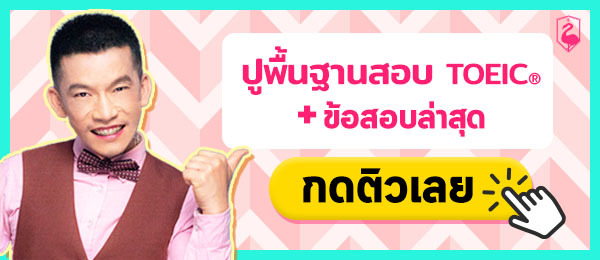
ติว TOEIC กับครูดิว ดียังไง?
- คอร์สติว TOEIC ของครูดิวนั้น เรียน Online
- แบ่งบทเรียนชัดเจน เรียนง่ายไม่งง คลิ๊กเลือกบทเรียนที่ต้องการได้ทันที
- สามารถหยุด, เล่นซ้ำบทเรียนที่ต้องการได้แบบไม่อั้น! (ตลอดระยะเวลาคอร์ส)
- อัพเดทข้อสอบ New TOEIC ใหม่ล่าสุด! ครบชุด!
- มีไฟล์ E-Book (PDF) ประกอบการเรียนให้ดาวน์โหลด (และมีหนังสือเรียนเป็นเล่มส่งให้ถึงบ้าน)
- เรียนเวลาไหนก็ได้ อยู่ที่ไหนก็เรียนได้ แค่มี Internet
- หากมีข้อสงสัยเกี่ยวกับบทเรียน สามารถส่งคำถามหาทีมงานได้
- การันตีคะแนน 750+ (หากสอบแล้วไม่ถึง สามารถแจ้งทวนคอร์สได้ฟรี!)
ทดลองติว TOEIC ฟรีได้ที่ >>> คอร์ส KruDew TOEIC
ลองทำข้อสอบ TOEIC เรื่อง Pronouns
ลองไปทดสอบความรู้กันดูหน่อยดีกว่า (แนวข้อสอบ TOEIC — ลองทำก่อนนะ เฉลยอยู่ด้านล่าง)
1. The board of directors thanked Ruby Lin for _____efforts in organizing the shareholder’s meeting.
(A) her
(B) she
(C) herself
(D) hers
2. Jettizon Company expects that the new e-mail system will not affect _____ clients.
(A) it
(B) their
(C) its
(D) them
3. Unfortunately, replacing the copy machine will cost more than _____ had anticipated.
(A) us
(B) ours
(C) we
(D) our
4. While some countries have made huge investments in the Caribbean lately, others have reduced _____.
(A) themselves
(B) their
(C) they
(D) theirs
5. Mr. Takara has decided to employ a payroll service because it is becoming too difficult to manage the payroll accounts _____.
(A) himself
(B) him
(C) he
(D) his
เฉลย
1. ตอบ (A) her เพราะด้านหลังมี efforts เป็น N. แสดงว่าด้านหน้าคำที่จะมาขยาย แสดงความเป็นเจ้าของได้คือ Possessive Adjective
2. ตอบ (C) its เหมือนกับข้อที่แล้ว มีคำนาม clients แสดงว่าด้านหน้าต้องเป็น Possessive Adjective แต่ข้อนี้ต้องดู Subject ด้วยคือ Jettizon Company เป็นเอกพจน์ ดังนั้นต้องใช้ its (ใช้ their ไม่ได้นะ)
3. ตอบ (C) we เพราะหลังช่องว่างเป็น V. (had anticipated) แสดงว่ายังขาดประธานอยู่ ซึ่ง Pronoun ที่จะมาเป็นประธานได้ก็คือ Subject Pronoun คือ we นั่นเอง
4. ตอบ (D) theirs ข้อนี้ตำแหน่งของช่องว่างตามหลัง S (others) และ V (have reduced) อยู่ แสดงว่าต้องเป็น Object แต่จะเลือก theirs หรือ themselves ดี? – ต้องตอบ theirs นะ เพราะความหมายคือมีพูดถึงในท่อนแรกว่า “some countries have made hugh investments” แต่ others have reduced____ (ลดอะไร? ก็ต้องลดการลงทุนเหมือนที่กล่าวถึงในท่อนแรกสิ) แสดงว่าใช้ theirs เพื่อหมายถึง their investments นั่นเอง ถ้าใช้ themselves ความหมายจะเปลี่ยนไปเลยคือ ประเทศอื่นๆ ได้ลดด้วยตัวพวกเขาเอง — ลดอะไรก็ไม่รู้ =.=”
5. (A) himself ข้อนี้เป็นการเน้น ซึ่งประธานเป็นคนเดียวกัน เพราะเขาบอกว่า Mr. Takara ตัดสินใจใช้บริการเรื่องการจ่ายเงินเดือน เพราะว่ามันเริ่มยากเกินไปที่จะจัดการเรื่องนี้ด้วยตัวเขาเอง
[Update] ประโยคคำถาม Wh-Questions ที่ต้องการคำตอบ | การ ใช้ i you we they he she it – NATAVIGUIDES
สวัสดีค่ะนักเรียนชั้นป. 6 ทุกคน วันนี้ครูจะพาไปตะลุยตัวอย่างวิธีการแต่งประโยคคำถามด้วย Wh- Questions ที่ใช้กับเวลาในอดีตและคำถามทั่วไปที่ต้องการคำตอบแบบไม่ใช่ Yes หรือ No กันค่ะ ไปดูกันเลย
อะไรคือ Wh-Questions
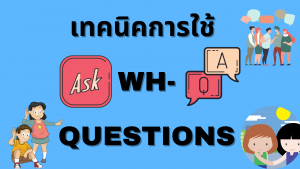
เมื่อต้องถามคำถามอะไรก็ตามที่ไม่ต้องการคำตอบ Yes หรือ No แบบทื่อๆ เราจะเรียกคำถามประเภทนี้ว่า Question word หรืออีกชื่อในวงการคือ Wh-Questions ซึ่งได้แก่คำถามที่มักจะขึ้นต้นด้วย Wh เช่น What, When, Where , Why, Whose, Which, Whom, Who แต่ว่าจะยกเว้นคำถามที่ขึ้นต้นด้วยพวก How , How much , How many , How long แต่ก็เป็นคำถามประเภท Question word หรือ Wh-Question เหมือนกันนะคะแม้คำขึ้นต้นไม่เหมือนกันก็ตาม พร้อมแล้วก็ไปลุยกันเลย
ประเภทของ Wh-Questions ที่ต้องการคำตอบ
When = เมื่อไร
เมื่อใช้ขึ้นต้นคำถามที่ต้องการถามเกี่ยวกับ เช่น
· When is your birthday? = วันเกิดของคุณคือเมื่อไร?
· When was your first love? = คุณมีควมรักครั้งแรกเมื่อไหร่
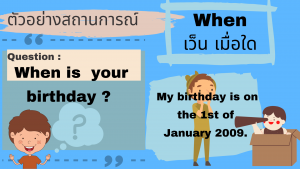
What = อะไร
ใช้ขึ้นต้นคำถามที่ต้องการถามใช้ถามเกี่ยวกับสิ่งของ ชื่อ วันที่ เวลา สิ่งที่รักที่ชอบ ดังนี้ค่า
· What is your name? = เธอชื่ออะไร?
· What is your favourite colour? = เธอชอบสีอะไร

Where = ที่ไหน
ใช้ขึ้นต้นคำถามที่ต้องการถามใช้ถามเกี่ยวกับ เช่น
· Where are you from? Or We do you come from? = คุณมาจากไหน
· Where should we go? = เราควรจะไปไหนกันดี

Why = ทำไม
ใช้เมื่อขึ้นต้นคำถามที่ต้องการถามใช้ถามเกี่ยวกับ เช่น
· Why did you come to school late? = ทำไมคุณถึงมาโรงเรียนสาย
· Why did you leave him? = ทำไมเธอถึงทิ้งเขาล่ะ
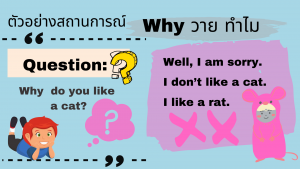
Who = ใคร
ใช้เมื่อขึ้นต้นคำถามที่ต้องการถามใช้ถามเกี่ยวกับ (ส่วนมากจะตอบเป็นชื่อคนนะคะ) เช่น
· Who are you? (คุณคือใคร?)
· Who is that? (นั่นใคร?)
· Who do you live with? (คุณอาศัยอยู่กับใคร?)

Whose = ของใคร
ใช้ขึ้นต้นคำถามที่ต้องการถามใช้ถามเกี่ยวกับการ เช่น
· Whose books are these? = นี่คือสมุดของใครนะ
· Whose pen is this? = นี่คือปากกาของใครกัน
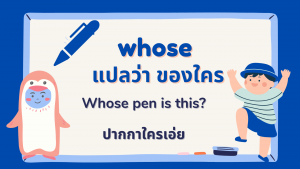
Whom = ใคร (ใช้เป็นกรรม)
ใช้ขึ้นต้นคำถามที่ต้องการถามใช้ถามเกี่ยวกับ เช่น
· Whom are we waiting for? = พวกเรากำลังรอใครอยู่กันนะ?
· Whom are you going to travel with? = เธอกำลังจะไปเที่ยวกับใครนะ
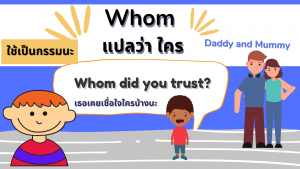
Which = อันไหน/สิ่งไหน
ใช้ขึ้นต้นคำถามที่ต้องการถามเพื่อให้ หรือ ทำว่าสิ่งไหน อันไหน ดังประโยคด้านล่างนะคะ
· Which is better? แปล อันไหนดีกว่ากัน
· Which one is your bag? แปลว่า อันไหนเป็นกระเป๋าเธอเหรอ

How = อย่างไร/เท่าไร
How เป็นคำเดียวที่ไม่ได้ขึ้นต้นด้วย wh แต่เราสามารถใช้ how ขึ้นต้นคำถามที่ต้องการถามเกี่ยวกับเรื่องต่างๆ เช่น
· How do you go to school? แปลว่า เธอไปโรงเรียนยังไง
· How do you do? เป็นคำถามทักทายแปลว่า คุณเป็นอย่างไรบ้าง เวลาตอบก็ตอบ How do you do?

ตารางสรุปประเภทของ Wh-Questions
Wh-Questions
กริยา
ประธาน
ส่วนที่เหลือในประโยค
When (เมื่อไร)
Why (ทำไม)
Who (ใคร)
What (noun) ( อะไร )
Where (ที่ไหน)
was
were
Subject
+ …………… ?
did
Subject
Verb 1 + …… ?
How ( อย่างไร เท่าไร)
How many + N. (พหูพจน์) = มากเท่าไร
How much + N. (นับไม่ได้) = มากเท่าไร
How long ( ยาวนานเท่าไร)
การใช้ Question word ในการถามและตอบคำถามเมื่อกริยาในประโยคเป็น be ( verb to be ) ทำได้ตามโครงสร้างดังนี้ค่ะ
” Wh+ was+ subject (singular)+ ……………. ?
Wh+ were+ subject (plural)+ ……………. ?”
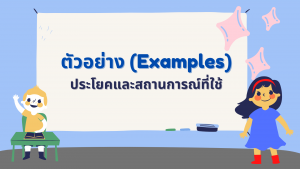
ตัวอย่าง (Examples) ดังในตาราง
ประโยคคำถาม
Liza:
Where
was
he
she
it
I
yesterday?
were
you
we
they
ประโยคคำตอบ
Jenny:
He
She
It
I
was
at the concert
yesterday.
You
We
They
were
ถามมา-ตอบไป
กับโครงสร้าง: Where + was, were + ช่วงเวลาในอดีต
ประโยคคำถาม
ประโยคคำตอบ
Where was she three years ago?
She was in the USA.
What was your elementary school?
My elementary school was NokAcademy school.
When was he a student at NokAcademy?
He was a student at NokAcademy school two
years ago.
Why was he a student at NokAcademy school ?
He was a student at NokAcademy school because
his parents worked there.
How long were they studying at NokAcademy School?
They were studying at NokAcademy school for 5 years.
เมื่อกริยาในประโยคเป็นกริยาแท้
ตามโครงสร้าง Wh-question + did+ subject+ verb 1+ …?
ประโยคคำถาม
Pinky:
Where
did
I
you
we
they
he
she
it
go
last week?
ประโยคคำตอบ
Danny:
I
We
You
They
He
She
It
went
to Japan last week.
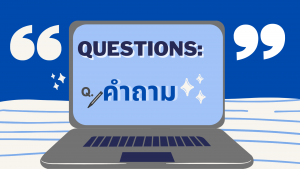
สรุปการใช้ Question Words ในการถามและตอบคำถาม
หลัง Wh-Questions (What, Where, When, Why…. ) ทั้งหลายจะตามด้วย กริยาช่วย was /were แล้วตามด้วย ประธาน (Subject)นะจ้ะ
และอาจจะมีส่วนขยายหรือไม่มีก็ได้เช่นกันและถ้าหลัง Wh Questions (What, Where, When, Why…. ) ทั้งหลายจะตามด้วยกริยาช่วย did แล้วตามด้วย ประธาน ( Subject ) เท่านั้นเด้อจร้า นอกจากนี้การใช้ Wh- question เป็นประธานให้สังเกตว่า ใคร กับ อะไร จะอยู่หน้าประโยคเมื่อแปลเป็นไทย
Lucy: Where did she go last night ? เมื่อคืนเธอไปไหนมา
Anna: She went to the birthday party last night. หล่อนไปงานเลี้ยงวันเกิดมา
Jack: When did you go to the New year’s party ? เธอไปงานเลี้ยงปีใหม่ตอนไหน
Tina: I went to the New year’s party last night. ฉันไปเมื่อคืนนี้เอง
Nim: Who did you meet at the school yesterday? เมื่อวานคุณไปเจอใครมาที่โรงรียน
Namtan: I met the school director. ฉันเจอผอ.มา
Tida: What did you eat this morning? คุณกินอะไรเมื่อเช้านี้
Wisa: I ate porridge. ฉันกินข้าวต้มมา
Wai: How did they dance last night? พวกเขา เต้นรำ อย่างไร เมื่อคืน ที่แล้ว
Needa: They danced beautifully. พวกเขา เต้นรำอย่างสวยงาม
Mirinda: Why did two dogs die last year? ทำไมสุนัข 2 ตัว ตาย เมื่อปี ที่แล้ว
Tiffani: They had nothing to eat. พวกมันไม่มีอะไรกิน
เป็นยังไงกันบ้างคะทุกคน ขอให้สนุกกับการเรียนเรื่อง Wh- Questions ที่ใช้กับเวลาในอดีตและคำถามทั่วไป กันนะคะ
นักเรียนที่รักทุกคนอย่าลืมทบทวนบทเรียนที่วีดีโอด้านล่างเพิ่มเติมเพื่อจะได้เข้าใจมากขึ้นนะคะ เลิฟๆ
+1
Pronouns : ep 1 Pronoun คือ คำสรรพนาม แล้วมันคืออะไรนะ
จัดทำขึ้นเพื่อเป็นส่วนหนึ่งในการเรียนรู้
ติดตาม Facebook และ Instagram : The Happy Time with Q
หากผิดพลาดประการใด ผู้จัดทำขออภัยมานะที่นี้ด้วยค่ะ 😀
นอกจากการดูบทความนี้แล้ว คุณยังสามารถดูข้อมูลที่เป็นประโยชน์อื่นๆ อีกมากมายที่เราให้ไว้ที่นี่: ดูเพิ่มเติม

Pronouns – He, She, It
Kindergarten Lesson in English Language

ติว TOEIC : Pronoun คืออะไร? เทคนิคการใช้โดยครูดิว
✿ ถ้าพื้นฐานน้อย แนะนำหาคอร์สติวดีกว่าค่ะ! ✿
👉 สมัครคอร์ส KruDew ติว New TOEIC 2020 (ทดลองติวฟรี!) ➡️ https://bit.ly/2wR4Gmu
✿ คอร์ส KruDew ติว TOEIC มีอะไรให้บ้าง? ✿
✅Grammar ที่ใช้สอบ TOEIC ให้ครบ เริ่มสอนจากพื้นฐาน เรียนได้ทุกคนแน่นอน
✅เทคนิคช่วยจำต่างๆ จำง่าย เอาไปใช้กับข้อสอบได้จริงๆ
✅เก็งศัพท์ TOEIC ออกข้อสอบบ่อยๆ ให้ครบ ไม่ต้องเสียเวลาไปนั่งรวบรวมเอง
✅ อัพเดทข้อสอบ New TOEIC ล่าสุด ครบ 200 ข้อ
✅สามารถสอบถามข้อหรือจุดที่สงสัยได้ตลอด
✅การันตี 750+ (ถ้าสอบแล้วไม่ถึง สามารถทวนคอร์สได้ฟรี)
📣 ถ้าไม่อยากพลาดคลิปดีๆแบบนี้ อย่าลืมกด ❤️ Subscribe ❤️กันนะคะ

The Object Pronouns Song by Teacher Ham!
Follow me online:
https://sambarbour.hearnow.com/
Hello everyone, here’s another new easy English song for children:
The Object Pronouns Song by Teacher Ham!
This song is easy and repetitive and fun to sing. It introduces the object pronouns, him, her, them, it, you, me and us.
Enjoy!
Subscribe to Teacher Ham HERE for more English teaching and music resources: www.youtube.com/user/englishtv123
This is a fun and easy song for children to assist students in learning some of the commonly used object pronouns.
Written, performed \u0026 recorded by Samuel Alexander Barbour
Copyright 2018. All Rights Reserved.

Lesson 18 – Subject Pronouns (I, you, he, she, it, we, they) – Learn English with Jennifer
Read a short text aloud with me. WATCH https://youtu.be/sjsIFeT4zKo
Lesson 18: Subject Pronouns (I, you, he, she, it, we, they)
Natasha and I continue to practice using the present forms of BE.
These are REAL lessons. No actors. No scripts. A real learning experience.
Do you know a friend or family member who needs to learn English? Tell them they can learn along with Natasha as I teach her the basics of the English language.
I will not be posting captions (subtitles) on these early lessons. I want beginners to develop their listening skills. I will write all important information on the board. Happy Studies to all!
TEACHERS: A related post is on my WordPress blog. http://englishwithjennifer.wordpress.com/2012/01/25/whoswhopraticewithpresentformsofbe/
Please post comments and questions on my main channel page or my website. www.englishwithjennifer.com
Music credit:
\”Smart, Easy Listening\”
Artist: Enrique Plazaola
Retrieved from http://www.flashkit.com/loops/Easy_Listening/Instrumental/smart_eEnrique_9644/ For more by this artist, visit http://www.enriqueplazaola.com/

นอกจากการดูบทความนี้แล้ว คุณยังสามารถดูข้อมูลที่เป็นประโยชน์อื่นๆ อีกมากมายที่เราให้ไว้ที่นี่: ดูบทความเพิ่มเติมในหมวดหมู่MAKE MONEY ONLINE
ขอบคุณที่รับชมกระทู้ครับ การ ใช้ i you we they he she it
